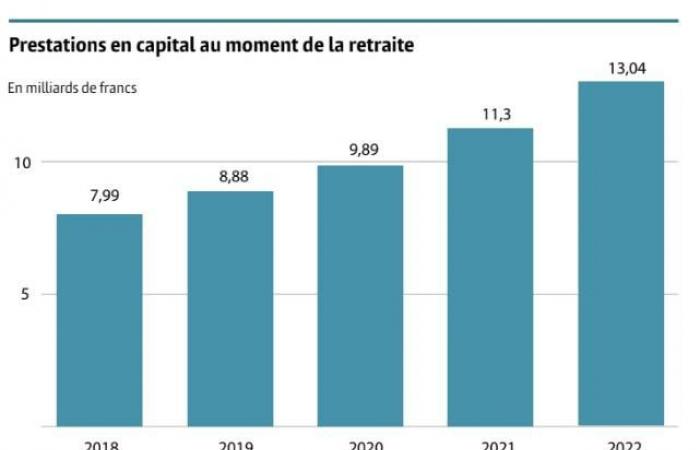Switzerland has style
“Our country will assert itself,” thinks Jean-Pierre Stillhart, director of German-speaking Swiss clients at the Vontobel bank: “Switzerland is one of the most attractive and competitive economic centers in the world and, since 2009, it has been included in the top 5 of the World Economic Forum’s “Global Competitiveness Report”. I am therefore convinced that Swiss asset managers will be able to maintain their competitiveness or even increase it.”
Karsten-Dirk Steffens, Director of Switzerland Abrdn Investments, agrees: “I believe that asset managers and the entire banking sector in the Swiss financial center will continue to develop positively.” Given the number of takeovers and consolidations, it is certainly possible that growth will slow down a little, but the capital to be managed in Switzerland and the number of wealthy clients should continue to increase, in particular due to the immigration of highly qualified personnel. .
There is a clear trend of increasing importance of investments in private markets
“We Swiss are often too modest,” laments Verena Gross, at Pictet. But our country should be proud of itself and be more assertive. Internationally, there is a lot of competition which does not fail to promote itself. See Hong Kong, Singapore, London and Dubai. But Switzerland looks good: its financial center is strong, it has an innovative infrastructure – think about tokenization –, competent employees, a strong currency and a stable political context accompanied by security. sound legal framework.” Furthermore, Switzerland has implemented all international standards.
It is the task of the government and politicians to preserve and multiply these assets, to support the sector by ensuring the promotion of the financial center on the international scene. “The financial sector always needs good framework conditions,” recalls Verena Gross.
Growth levers
Frank Rosenschon, Head of Institutional Client Business Switzerland BlackRock, is sure: “There is a clear trend, that of the increasing importance of investments in private markets, especially in institutional portfolios, because they contain additional sources of return .” Pictet expert Verena Gross is also convinced that private market investments, such as private equity, will become even more important as an allocation class.
This is why investments in infrastructure are becoming increasingly important because many countries are focusing on digitalization and decarbonization, which opens up new and interesting investment prospects for investors. It seems that the role of artificial intelligence is also very promising, both as an investment object and in internal processes and interaction with customers. That said, it is currently unclear how these trends will evolve in the long term and what regulatory challenges they will bring.
More or fewer employees?
“The wealth management sector will continue to grow in Switzerland,” predicts Jean-Pierre Stillhart, at the Vontobel bank. But to exploit the opportunities ahead, companies must attract and retain the best talent. With the advent of artificial intelligence, we will fight even harder with technology groups to attract engineers and all kinds of AI experts. This is why we must remain attractive to young talents.”
At Abrdn, Karsten-Dirk Steffens is also very confident: “Of course, the wealth management sector has already consolidated significantly and there will undoubtedly be further consolidation, but overall the sector should continue to grow.” And this in particular because of demanding service requests in financial offers which are becoming more and more complex. Large banks must increasingly focus on “affluent business”, business with wealthy clients, to keep up with the competition. This leaves growth opportunities for family offices, wealth managers, online institutions, etc.
At Pictet, Verena Gross draws a positive assessment: “With the disappearance of Credit Suisse, the banking sector has certainly lost jobs, but as Switzerland is well positioned internationally and remains an attractive financial center, we are starting from idea that in the long term the number of employees in the banking sector will remain stable.”
Due to increasing cost pressures, the strong Swiss franc, international competition and the opportunities that AI offers to automate certain procedures, it is mainly downstream departments that are expected to cut staff. On the other hand, the customer interface should continue to gain importance.
BlackRock expert Frank Rosenschon agrees: “Asset management clients’ need for services will continue to increase.” It is then that we evoke the notion ofoutsourcing, outsourcing certain tasks. “Technological change, ever more complex products and increasing regulatory requirements will further strengthen this trend.” Clients need more than just a product offering; they expect comprehensive advice from their asset manager on the product and their portfolio. Frank Rosenschon assumes that this trend will continue over the next five to ten years.
European context
On this point, Karsten-Dirk Steffens is the most optimistic: “There is a high probability that Switzerland will still have to move closer to the EU, particularly in terms of financial regulation and policy in order to strengthen the internal market.” But it will continue to try to chart its own royal path to comply with European requirements.
“In the coming years, the EU will focus even more on itself and on the challenges that await it,” thinks Verena Gross of Pictet. Because difficulties arise everywhere: migration, digitalization, polarization of society, aging of the population and state debt, to name just a few? Switzerland, for its part, is one of the EU’s most stable partners. We hope that the new EU Commission will recognize this and that relations will stabilize as best they can in bilateral negotiations.” Market access for the entire Swiss economy, including wealth management banks, remains a subject of debate. But the EU market lockdown is expected to continue. Banks of a certain size generally have onshore sites and are therefore less affected. “Many EU customers want to be supported in Switzerland, the EU and its member states benefit from investments from Switzerland, so market access is decisive.”
Yves de Montmollin, director of Banque Bonhôte, is less confident. He notes that we are increasingly turning away from free trade and that mercantilism is making a comeback, so that capital flows are increasingly strictly controlled. The big blocs (United States, China, European Union and an eastern bloc in formation) will look after their own interests above all. Competitiveness and the quality of service provision will lose their weight. “In this new context which is taking shape, the Swiss financial center is in danger of losing its competitive advantage,” he fears.
Sustainability less fashionable?
Not all trends can be continued. According to Karsten-Dirk Steffens’ observations, sustainable investing has somewhat lost its importance in the private investor segment. The great euphoria of the beginnings increasingly loses its momentum. This could above all be linked to the fact that, on the one hand, a certain uncertainty – not to say confusion – has taken over regarding the credibility of sustainable financial products. On the other hand, it remains to be seen to what extent crypto markets will be able to establish themselves.
Opportunities in the 2nd pillar
The online wealth management establishment True Wealth particularly places its opportunities in the 2nd pillar. Because the tendency to withdraw one’s pension in the form of capital rather than as an annuity has clearly increased.
Felix Niederer, its boss, is banking on practical digital concepts to make capital withdrawal even more attractive. “For a residual life expectancy of 20 to 22 years at the age of 65, online wealth management which offers a return with a capital recovery rate that each person sets at their discretion is a very appropriate solution. For this target customer, we now offer a direct debit plan.” But the accounts only come into play if management scrupulously respects tailor-made cost efficiency.
Upward fluctuations
In recent years, the wealth management sector in Switzerland has experienced some fluctuations. According to the 2023 Bank Barometer of the Swiss Bankers Association (SBA), at mid-2023, assets managed by banks amounted to 8,281 billion francs, which represents an increase of 5.5% compared to the previous year. In 2022, on the other hand, we saw a clear decline of 11.2%, in particular due to the negative development of the stock markets (see table).
The industry is very fragmented. At the end of 2023, there were 1,852 asset managers in Switzerland. Only half of them are members of the ASG, the Swiss Association of Asset Managers. Independent asset managers oversee a total amount of around 500 billion francs, or barely 6% of all private funds under management in Switzerland. The remaining 94% is entrusted to the Big 8 (UBS, Pictet, Julius Baer, UBP, Vontobel, Lombard Odier, Safra Sarrasin and EFG), which manage client assets in excess of 100 billion francs. On the other hand, almost a third of ASG members manage amounts of less than 50 million.







